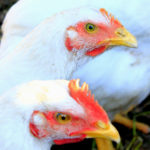Coccidiosis is the bane of poultry farming. Each year, this parasitic disease costs over 3 billion USD to the industry worldwide, in production loss as well as in preventive and curative treatments. Coccidiosis comes in various strains and can reproduce easily in any poultry house, which makes its eradication difficult.
The high cost of coccidiosis for the broiler industry
The French poultry industry estimates that, in fast-growing broiler farms, coccidiosis costs 0.10 euro per chicken. This protozoan parasite primarily affects chicken with a low immune system and a fragile general state. It often breaks out in farms where birds lack individual space, stay on a wet litter and suffer from a high level of stress. However, coccidia are naturally present in the environment and the disease can spread in any farm.
Birds may develop a clinical form of the disease, leading to epidemic outbreaks and eventual loss of the flock. Nonetheless, 70% of coccidiosis cases remain sub-clinic and thus hard to detect. Over time, these cases alter growth and reduce the feed consumption index.
The use of coccidiostats in chicken feed (e.g., salinomycin, narasin, nicarbazin) is a commonly used solution to manage the disease in standard farms. These molecules block the development of coccidia in the broiler digestive track. However, this strategy can negatively affect the image of the farm at a time when consumers demand products that are more natural (antibiotic free, etc.). An even stronger concern for farmers is the development of drug-resistant coccidia.
Vaccination presents an efficient alternative. This preventive solution is spreading in certified broiler farms, especially in organic agriculture, which bans the use of coccidiostats. However, vaccination cost remains prohibitive for most standard farmers.
Norponin®XO, a 100% natural solution to contribute to coccidial risk
Societal, market and regulatory pressure forces the poultry industry to adapt and develop innovative solutions against coccidiosis. The shift is occurring worldwide. Norway has banned the use of coccidiostat Narasin in 2016. Similarly, in the last five years, the US poultry industry evolved from less than 5% to 40% of chicken raised without anticoccidial ionophores, under the pressure of fast-food chains.
To help farmers to maintain performances under coccidiosis pressure, Nor-Feed has developed a product range called Norponin®XO. Products’ composition includes a mix of specific plants that contain natural saponins. These molecules have a scientifically proven antiprotozoan effect and improve the microbiological balance of chicken guts, thus limiting contamination risk. A study in Peru in 2017 showed that saponins from Norponin® XO was as efficient as synthetic coccidiostats.
Furthermore, a recent study in Turkey showed that Norponin® XO2 supplementation offers a better R.O.I than chemotherapy (5:1 versus 3:1), as well as a better EPEF (European Production Efficiency Factor). Farmers can integrate Norponin® XO in any rotation or shuttle program. Indeed, studies performed the last years shows that Norponin® XO supplementation was as efficient as synthetical cocciostats either from chemical or fermentation origins

